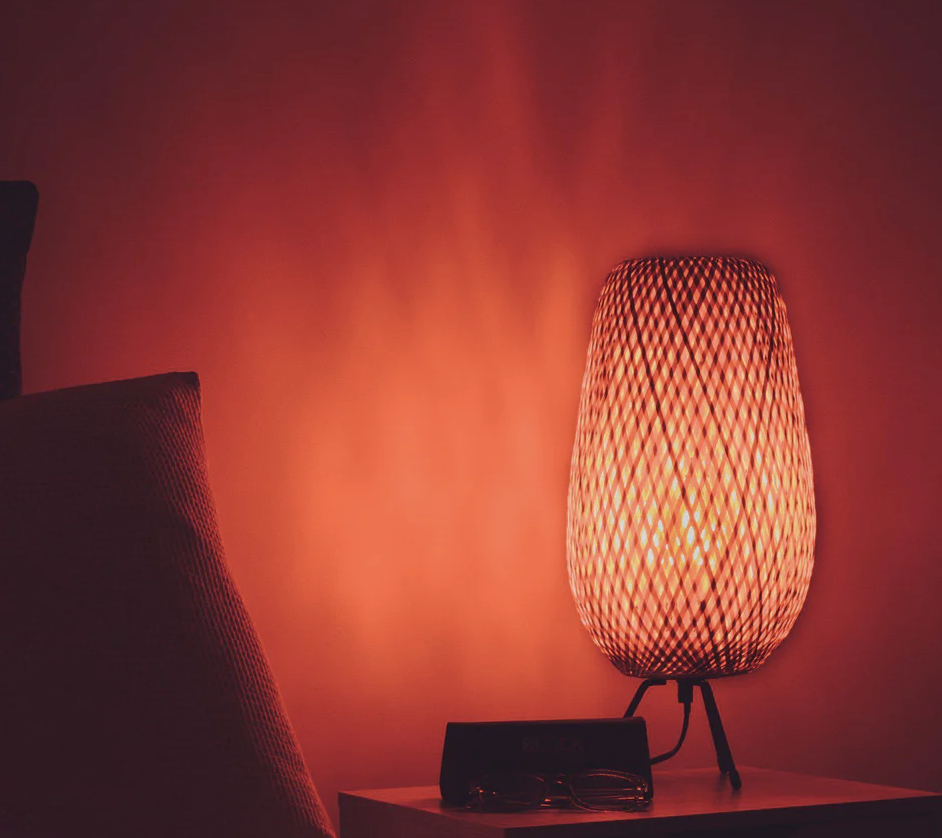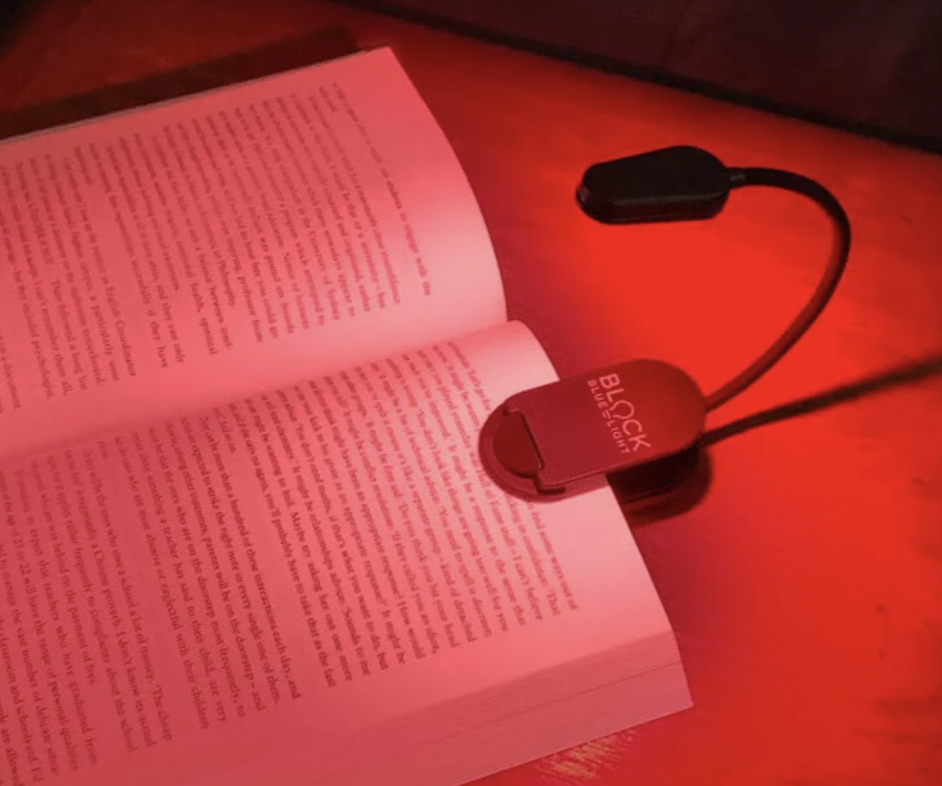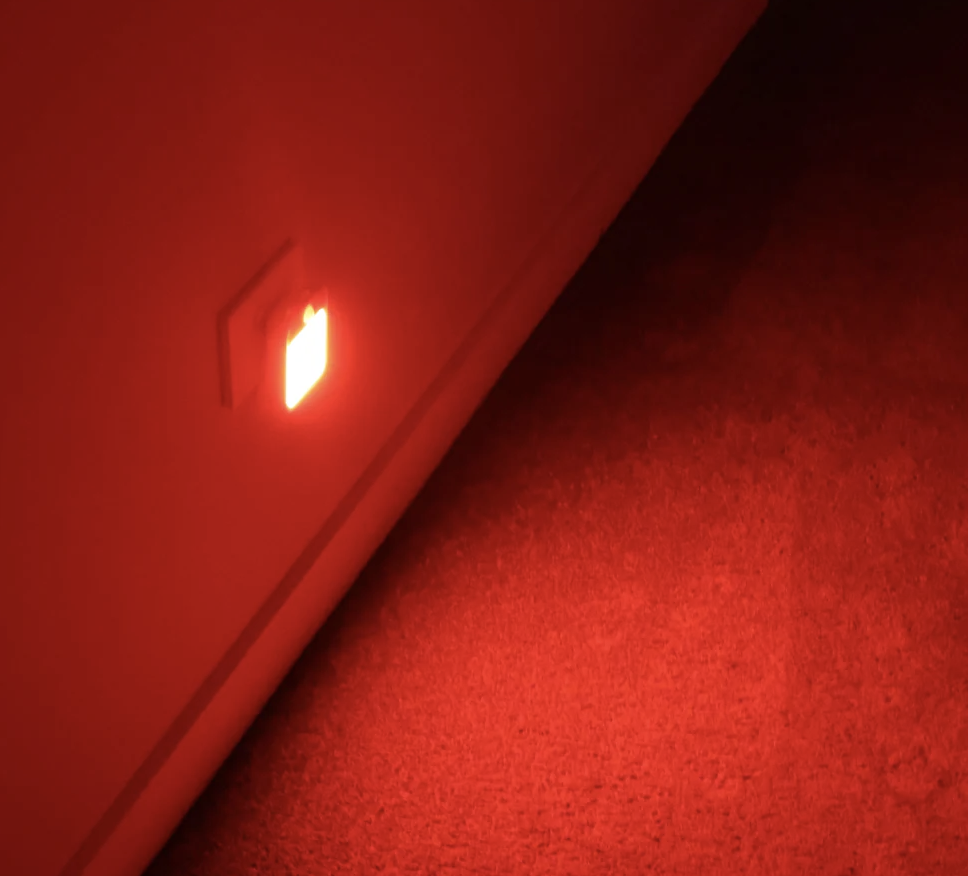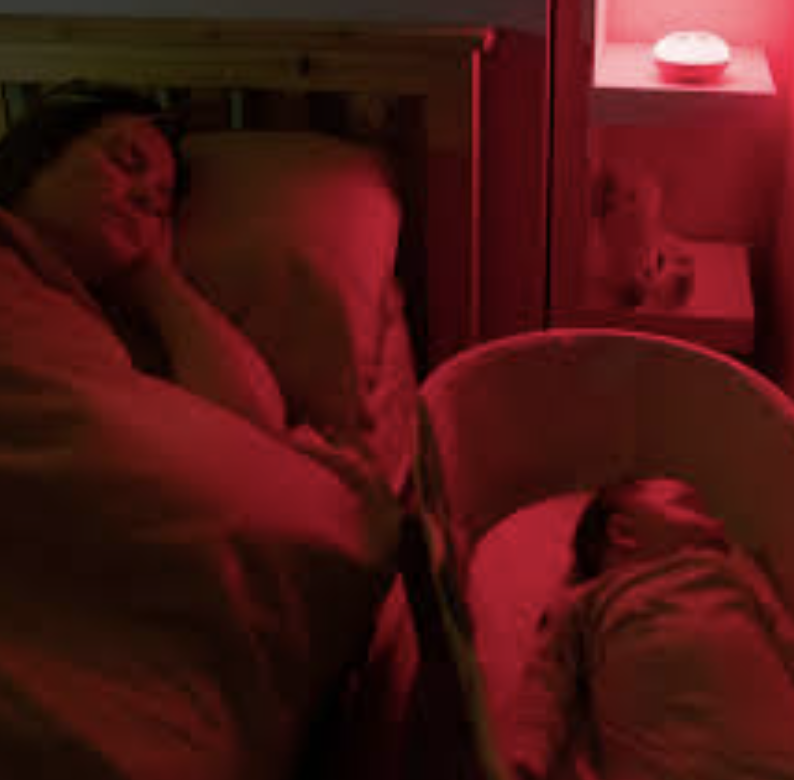The Hidden Dangers of Blue Light Exposure During Pregnancy
In today’s digital world, blue light is everywhere, on our phones, computers, TVs, and even in artificial outdoor lighting. While blue light is part of the visible light spectrum and naturally emitted by the sun, prolonged exposure to it, especially from artificial sources during the evening, can have harmful effects on your health, particularly during pregnancy. New research is revealing that excessive exposure to blue light can increase the risk of gestational diabetes, preterm birth, disrupt sleep patterns, and may even make labor more painful. Sitting in front of a screen for hours at a time is also associated with eye/vision issues and skin aging.
But let’s start with what you need to know to protect yourself and your baby.
(Learn how to help your newborn sleep longer with the right light at night).
The Link Between Blue Light and Pregnancy Health
Blue light can disrupt your circadian rhythm, which regulates your sleep-wake cycle. When you’re exposed to blue light in the evening, it suppresses the release of melatonin, a crucial hormone for health that helps your body relax and prepares it for sleep (amongst a million other functions) including anti-inflammatory, antioxidant, neuroprotective, sleep promoting and immune enhancing properties. It has been shown to be a regulator of physiological processes associated with human reproduction, embryo and fetal development.
During pregnancy, melatonin levels are especially important for maintaining healthy sleep patterns, supporting your body’s metabolic functions and sharing melatonin with your baby for when they develop their own circadian rhythm. We were never supposed to be exposed to so much blue light without the balancing effects of the rest of the wavelengths of sunlight which are essential for health. A recent study from China links outdoor ALAN (Artificial Light at Night) in the first and second trimester with preterm birth.
Quality Sleep is Essential in Pregnancy
Sleep isn’t just about lying still and dreaming - it’s like what happens at Disneyland after all the visitors have gone home. Imagine a team of workers coming in to clean up, fix broken rides, repaint where needed, and make sure everything is running smoothly for the next day. During sleep, your body works the same way: it repairs tissues, clears out waste, and restores balance to keep everything functioning properly. In pregnancy, this process is even more crucial because your body is working overtime to support both you and your baby. Sleep helps with your baby’s development, keeps your immune system strong, and ensures that your body is ready for the demands of pregnancy and birth. It’s like having an overnight crew making sure the park (your brain and body!) is in top shape for the next day of activity.
Disrupted Sleep and Longer More Painful Labors
Poor sleep is one of the primary consequences of evening exposure to blue light. Pregnancy can already make sleeping more difficult due to physical discomfort, hormonal changes, and of course our thoughts. When blue light suppresses melatonin production, you may find it harder to fall asleep, stay asleep, and get restful sleep. Research shows that disrupted sleep during pregnancy can lead to increased pain sensitivity during labor, making the birth experience more challenging and increasing your risk of a cesarean birth significantly.
Poor sleep quality is associated with increased risk for depression, short sleep duration is associated with increased incidence of diabetes, obesity, gestational hypertension, increased labor duration and cesarean births. Of the many disease outcomes associated with poor sleep, cardiovascular disease is relevant to several pregnancy complications, such as preeclampsia, intrauterine growth restriction, and preterm birth. (Wang et al., 2022).
In 2021 researchers also found an association between light pollution and prolonged labors.
Increased Risk of Gestational Diabetes
In addition to affecting sleep, exposure to blue light may increase the risk of gestational diabetes. Gestational diabetes occurs when your body has difficulty regulating blood sugar levels, and it has been linked to hormonal imbalances influenced by disrupted circadian rhythms. Research suggests that blue light can affect how your body secretes insulin, which is critical for controlling blood sugar levels. If your insulin response is impaired (pregnancy is considered a state of insulin resistance), your risk of developing gestational diabetes increases, potentially complicating your pregnancy and plans for labor.
Poor sleep & Cesarean Birth
Studies have shown that spontaneous birth is more likely to occur between 2:00 and 5:00 am, and that the likelihood of labor is higher during nighttime versus daytime (it’s thought that darkness was protective of mammals against predators). In addition to helping to regulate labor and birth melatonin reduces mitochondrial oxidative damage (eg, during preeclampsia) throughout the body. If you follow my work you’ll know that part of the spectrum of sunlight is red and NIR (near infra red) which supports mitochondrial health.
In another fascinating recent study scientists evaluated the impact of light-induced modulation of melatonin production on uterine contractions in women late in the third trimester (~36-39 weeks) of pregnancy. They found a significant (P < 0.05) association between circulating melatonin in the body and the number of uterine contractions. On average, uterine contractions increased between 1.4 and 2.1 contractions per 30 minutes for every 10 pg/mL*h increase in melatonin concentration.
Melatonin and Your Newborn
In pregnancy and postpartum your baby is completely dependent on you for melatonin. In postpartum your baby receives it through your breast milk during night hours. Consider all of the benefits to your baby for all of the reasons I listed at the beginning. Artificial light exposure at night that disturbs your melatonin may also in fact be harmful to your baby’s health. Get yourself a red/orange light for night time feedings. Learn how simply changing out your light bulbs during pregnancy and for postpartum can help you baby sleep longer.
Your baby’s circadian rhythm develops in the months after birth.
Be intentional about your device use and light exposure around your baby - for their longterm metabolic health and yours.
Is There Anything Good About Blue Light?
Yes - moderate amounts of blue light during daylight is essential for good health.
Promotes alertness
Boosts memory and cognitive function
Elevates mood
Regulates circadian rhythm (when you see daylight in the morning).
Tips to Reduce Blue Light Exposure in Pregnancy
To protect your health and reduce the risks associated with blue light, here are some practical steps you can take to minimize your exposure during pregnancy:
Get Natural Light During the Day: Natural sunlight helps regulate your circadian rhythm. Try to get outside during daylight hours without sunscreen, especially in the morning, to help your body maintain its natural sleep-wake cycle. Optimise your sun ‘collecting’ time without sunglasses. Light is processed through receptors in the brain and through the skin. Getting that red/NIR light in the early morning primes your skin for UV rays. We need to be exposed to UVB for Vitamin D production - which is low in most people these days due to the lack of direct sunlight. Low Vitamin D is associated with pre-eclampsia and also gestational diabetes…(are you starting to see a pattern?) Over exposure to blue light and little to no exposure to sunlight is a part of the problem - but most providers aren’t connecting these dots - yet. Get the free D-Timer app. And NO you don’t have to bake yourself sunburnt - but get those sun nutrients into you somehow! Even walking in nature allows near infra red to be reflected off the grass, leaves etc - it’s SO good for you - but most women are deficient in NIR and it’s many benefits by being indoors.
Use Blue Light Filters: Most smartphones, tablets, and computers come equipped with blue light filters or night modes that reduce the amount of blue light emitted by the screen. Be sure to enable these features in the evening, especially if you need to use your devices after sunset.
Wear Blue Light Blocking Glasses: These glasses are designed to block or filter out blue light. Wearing them while using digital devices or watching TV can help protect your eyes and support better melatonin production in the evening. (Do your research in this area as there’s a lot of rubbish out there).
Change Your Lightbulbs to Eliminate Blue Wavelengths: Consider appropriate dim, warm-colored light bulbs in the evening instead of harsh, bright lights. Red or amber light is less likely to interfere with melatonin production and won’t disrupt your circadian rhythm as much as blue light. But not all red/amber lights eliminate blue light so although the lighting is warm the blue wavelengths are still there - far from ideal in pregnancy and not ideal for your baby in postpartum.
Create a Sleep-Friendly Environment: Make sure your bedroom is a sanctuary for sleep by minimizing artificial light sources. This can include using blackout curtains to block out streetlights and removing any electronic devices that emit light from the room.
Limit Screen Time Before Bed: Try to turn off screens at least one hour before bedtime to allow your body to wind down and prepare for sleep. Instead of scrolling through your phone or watching TV, consider reading a book or practicing relaxation techniques such as mindful meditation.
Final Thoughts - Hospital Lighting
As new research emerges, it’s becoming clear that sunlight is important in pregnancy and chronic blue light (junk light) exposure during pregnancy can impact both maternal and infant health. However, with simple adjustments to your daily routine, such as limiting screen time in the evening and creating a more restful sleep environment, you can reduce your blue light exposure and help protect both your health and your baby’s development. Hospital lighting is NOT conducive to supporting physiologic birth - melatonin works beautifully with your body’s oxytocin to amplify those surges (make them more powerful). So be sure your partner knows to kill the bright lights and bring along a lamp with helpful wavelengths (deep oranges/reds). Wear blue blocker glasses as you walk into the hospital!
Future Research
The available research suggests that the full impact of artificial light on human health is not yet known however many animal studies demonstrate a connection between artificial light and it’s impact on birth. Recent research suggests light pollution especially in shift workers is associated with several metabolic health complications including obesity and cancer. There’s so much we don’t know but taking these steps will support not only your pregnancy but also your overall well-being as you prepare for the arrival of your little one and your postpartum.
Stay tuned for an upcoming blog on the current research on sunlight exposure in pregnancy and the impact of UVA and UVB on pregnancy health.
Further reading:
https://blog.tracydonegan.org/blog/help-your-newborn-sleep-longer-with-light
https://blog.tracydonegan.org/blog/the-mytime-melatonin-research-trial
https://blog.tracydonegan.org/blog/the-milo-melatonin-induction-trial
https://blog.tracydonegan.org/blog/maternal-metabolism-and-breastmilk
https://blog.tracydonegan.org/blog/chrononutrition-and-breastfeeding
https://blog.tracydonegan.org/blog/red-light-therapy-and-gestational-diabetes






